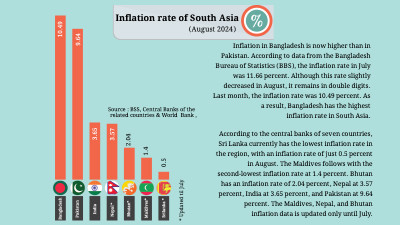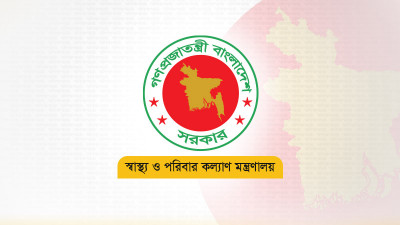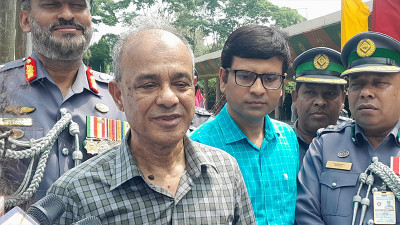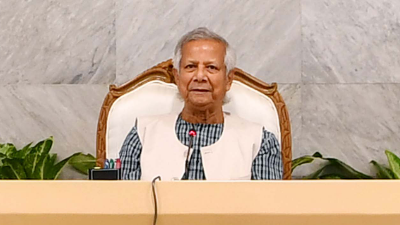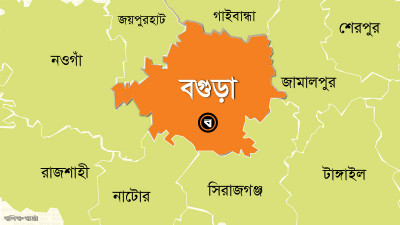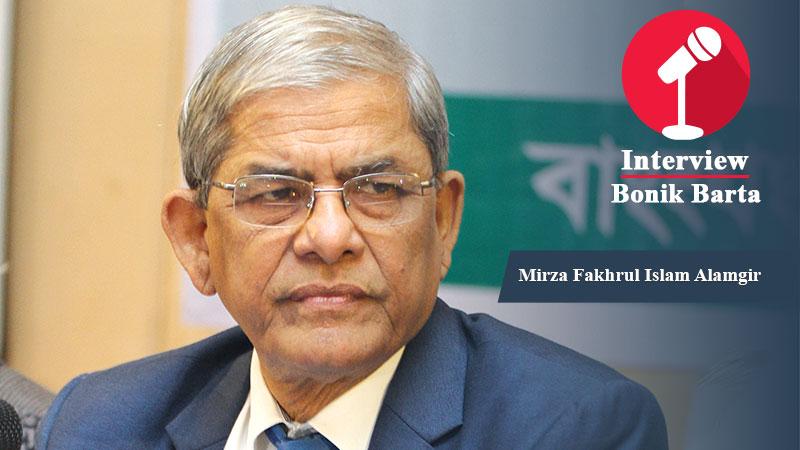 Photo: Bonik Barta
Photo: Bonik Barta Mirza
Fakhrul Islam Alamgir has been involved in politics even
before the country’s independence, spanning almost six decades. After briefly
working as a teacher, he became fully active in politics in the mid-1980s and
soon joined the Bangladesh Nationalist Party (BNP). Since 2011, he has been
serving as the party’s secretary general, leading during a time when the party
has been out of power for over fifteen years. In an interview with Bonik
Barta, he discussed the interim government and BNP’s thoughts on the
upcoming election. Anika Mahjabin conducted the interview.
It has been one month since the
interim government assumed office. How do you evaluate it?
The
current interim government differs slightly from previous ones in Bangladesh.
This government came into power after a spontaneous student-people uprising. Dr.
Muhammad Yunus is leading it. He is widely accepted by almost everyone.
Everyone likes him. People trust him and hold him in high regard. Although he hasn’t
been active in politics, his work in economics and for the people has made him
globally respected and accepted in this position.
It’s
difficult to say much about a government after just one month. However, many
members of this government lack experience in public administration and
governance, with only a few exceptions. There are some individuals with
experience—economists, bureaucrats, and people connected to NGOs. So, it’s
unrealistic to expect everything to improve overnight.
However,
Dr. Muhammad Yunus recently provided a framework in his speech, outlining his
vision and what he intends to achieve. I personally believe that the
commissions he has formed, particularly for reforms, are a positive step. He
has appointed capable individuals, and I believe it will yield good results.
The sooner these reforms are implemented, the better. Swift action will open up
opportunities to resolve the issues because, without a public mandate, no
government can achieve much in terms of sustainability. We hope these reforms
will be completed quickly.
But
public participation is crucial here. Reforms must be based on public opinion.
The process of how public opinion will be integrated is something they must
decide. Then, of course, the proposals must go to Parliament, elections must be
held, and the reforms must be ratified and incorporated into the Constitution.
The interim government has
indicated that elections will take place at a stage of the reforms. What do you
think the timeline might be?
I
don’t want to give an estimated timeline because it’s a complex matter. Giving
a specific timeframe would be hypothetical, and I’d prefer not to engage in too
many hypothetical statements. However, too much time shouldn’t be taken. A
reasonable amount of time should be allowed, and the sooner the elections take
place, the better it will be for both the government and the people.
What is your assessment of the
advisers in the interim government?
I
don’t wish to comment on individual advisers. I believe their actions will reveal
everything. As I’ve mentioned, most of them lack experience in working with the
government, so it’s unrealistic to expect flawless results immediately. But
they are trying their best, and many are doing well. I remain optimistic.
No politicians were included in
this interim government. Were you consulted on this matter when the government
was being formed?
The
decision to form the interim government was made in our presence. All political
parties, along with the heads of the defense and security forces, met at
Bangabhaban with the President. It was decided that this would be an interim
government. We all know the nature of such a government. Everyone in Bangladesh
wants a neutral government before the elections, a non-partisan one. The
absence of politicians shouldn’t cause much trouble, but it would help if the
government consulted political parties regularly to address this gap.
Has the interim government
communicated with your party in the last month?
Yes,
they have spoken to us twice already. We’ve had discussions and conveyed our
views to them.
What is your take on the
government’s role during the recent floods?
The
military played a major role in this year’s floods. NGOs and political parties
were also involved. The government did its part, though perhaps they could have
done more. It ultimately depends on the bureaucrats in charge. They may not
have been able to do everything, but NGOs stepped in to fill the gaps, and the
military contributed significantly.
There have been issues with DC
appointments in the public administration, and several institutions are
struggling due to various reasons. Do you think the interim government can
resolve this institutional crisis?
For
the past 15 years, people in this country couldn’t speak up about their grievances
or find justice. Now, in this open environment, it’s natural for people to
express their opinions and bring forward their complaints. This is not unusual.
I believe the reasonable approach now is to give this government some time. The
government is working, and we should allow them to do so. They should be given
advice, but nothing should be done to create a hostile situation for the
government.
Do you think this government is
capable of handling the chaos?
They
are trying. I don’t expect everything to change overnight. We’ve had a fascist
government, a highly partisan one. Most of the officials in various positions
were aligned with the ruling party. Removing them immediately isn’t feasible;
they need time to work. More experience would have helped them perform better,
and more communication with others might have yielded better results. I feel
there’s a lack of communication, but by engaging more frequently with
experienced people who’ve governed before, these issues can be resolved.
How do you view the law and order
situation in the country still not being under control?
In
light of the current circumstances, the law and order situation isn’t bad. One
thing to note is that there’s no major issue outside the industrial zones. In
the first few days, the police weren’t present, and even now they are absent in
some areas. Students have been managing the streets, and the general public has
cooperated. People have patrolled their neighborhoods at night to prevent theft
or robbery, something I’ve personally witnessed.
Our
party members have also taken to the streets, helping to patrol. Essentially,
all political parties have contributed in the hope that, after such a massive
student and public uprising and the fall of fascism, a breath of fresh air will
follow. Everyone anticipates that democracy will thrive here.
If this government fails to
administer effectively, what steps will the BNP take?
It’s
not yet time to speak of this government in that manner. I don’t want to delve
into hypothetical questions right now. We believe they’ll be able to do it, and
we’ll offer the necessary cooperation. I’m not going to answer that question
right now.
How do you evaluate the 2024 mass
uprising?
Those
of us involved in politics know Bangladesh well. The history of Bangladesh
shows that people have rebelled when necessary. We’ve always been hopeful,
which is why we’ve led protests in the streets. This student-people uprising
didn’t happen overnight. Over the past 15-16 years, we’ve reached this point
through great sacrifices, and as a party, we’ve made the most sacrifices. We’ve
been the most affected, the most persecuted. We protested. Our Chairperson
Begum Khaleda Zia was imprisoned for six years and is still unwell. Over 600 of
our people were forcefully disappeared, and thousands were shot dead. The
Sheikh Hasina government has filed false cases against 6 million
people—baseless, fabricated cases. So, we’ve been fighting this battle from the
start. I myself was jailed just a short time ago for this movement.
When
this movement began, 27,000 of our party members were imprisoned, from senior
leaders to ordinary members. During those few days, 1,700 cases were filed, all
against our party. Our leaders were jailed, tortured, and mistreated. Some
couldn’t change clothes for seven or eight days in prison. Even then, some of
our activists were shot dead. According to our records, the number is around
200. So, we created the conditions for this mass uprising. We’ve been fighting
for the past 15 years; this didn’t happen in a day.
Some people are concerned that the
BNP will follow the same political trajectory as the Awami League. Can the BNP
remain distinct from the Awami League?
I
completely disagree with that and protest it. The BNP has always been different
from the Awami League. The Awami League did many wrongs, and the BNP corrected
them. In 1975, the Awami League implemented a one-party system through BAKSAL,
and the BNP replaced it with a multi-party system. We introduced parliamentary
democracy. We added the caretaker government system to the constitution to
ensure free and fair elections. So, comparing the BNP to the Awami League is entirely
wrong. It’s an injustice.
The
Awami League and the BNP cannot be the same. The Awami League is a fascist
party; the BNP is a democratic party. BNP has made the most sacrifices for
democracy. I can confidently say that no leader of any political party has
sacrificed as much as Khaleda Zia. No political leaders have sacrificed as much
as BNP leaders. Can anyone imagine a democratic party facing false cases
against 6 million of its people? How many times have we gone to jail? How many
times has the police violently tortured us? Has everyone forgotten these
things? Do things happen overnight? Behind this student-people uprising are 16
years of our sacrifices. The BNP has sacrificed. Our leaders and activists have
sacrificed. Today, from the rickshaw pullers to the street vendors in Dhaka,
the majority are BNP supporters. They had to leave their own regions and come
to Dhaka. This is the reality.
How do you view the current state
of the Awami League?
The
Awami League is an old political party. But now Awami League has no element of
politics. It’s politically bankrupt now. Whether it can revive as an
organization depends on its future plans.
We’ve seen India’s influence in
Bangladesh’s politics over the past 15 years, especially in the elections
without much participation of voters where the Sheikh Hasina government
received their full support. How do you view India’s influence on the current political
landscape?
India
has always tried to influence our politics, and they’re certainly still doing
it. They previously had a direct influence, even if we don’t see it visibly
now. But by sheltering Sheikh Hasina, they may be not fully understanding the
political aspirations of the Bangladeshi people.
Is India attempting to maintain the
relationship that Sheikh Hasina said had elevated Bangladesh-India ties?
Of
course. They will do so. Every country acts in its own interest. I need to do
my job. Bangladesh will act in its own interest, and I hope it will now do just
that.
Can you shed light on the BNP’s
relationship with Jamaat-e-Islami?
Our
relationship is just as it should be between any two political parties. Jamaat
is a separate political party, and so are we. Jamaat’s goals and ideology are
one thing, ours are another. We are the party of the Liberation War. Our
founder declared independence. We definitely have a distinct position. We fully
believe in liberal democracy, while Jamaat advocates for an Islamic state. So,
there’s clearly a difference.
Will Jamaat’s growing influence
impact the BNP’s vote bank?
Why
do you say Jamaat’s influence is growing? Based on what? Because they’re
talking more? Because their pictures are being published more? This is a
propaganda I’m seeing in the media.
They
may appear in the media, as we have free democracy, but we have much more
influence. So, there’s no chance that our vote will be affected—rather, it will
increase. The BNP is the only political party that enjoys the public’s trust.
Whenever
the BNP has come to power, it has worked for the welfare of the people. It has
advanced the free market economy, worked for democracy, and fostered a
non-communal environment. Today’s foundation of Bangladesh’s economy is because
of the BNP. The ready-made garments sector, remittances, and the free market
economy began under the BNP. So, the public’s trust in the BNP is much greater.
I disagree entirely with the notion that Jamaat-e-Islami or any other party’s
influence is growing.
One of BNP’s 31 points is the
formation of a national government. Can you explain what this government would
entail?
As
I mentioned, there will be elections. In these elections, we will consider
forming a national government with the winning parties, excluding the Awami
League. Our goal will be to work toward implementing the 31-point plan.
How would the government view the
energy sector agreements signed under Sheikh Hasina’s administration?
I
believe the energy sector agreements should be reviewed. These contracts need
to be brought before the public. There has been significant corruption in the
quick rental contracts. Huge sums of public money have gone toward electricity,
but the people and the country are not receiving the expected benefits. A review
is essential, and actions must be taken against these agreements.
The interim government claims
inflation has decreased, but food prices haven’t. What’s behind this disparity?
It
won’t happen overnight. We must consider the characteristics of our business
community, the political environment, and various sectors. Change doesn’t occur
overnight. Good governance is needed. It will take some time and practice.
I’m
quite hopeful about the measures the economic adviser and the governor are
taking. These steps will undoubtedly steer the country from its fragile state
to a better place. I believe inflation will decrease.
Dr. Muhammad Yunus has good
relations with Western countries. Do you think Western influence is now greater
in Bangladesh’s politics?
I’m
not pointing to the influence of any particular country or power. The most
significant influence comes from the people of Bangladesh. The people of
Bangladesh want a democratic state, and that desire has had the greatest
impact. The Western world has supported our democratic movement. It supported
the movement because it was a people’s uprising. So, I believe not just the
Western world but the entire world will support this.
Can you explain the ‘Aynaghar’?
The
Aynaghar is a symbol of the extreme oppression of the fascist government. It
started with our MP Ilias Ali. He led the movement against the Tipaimukh Dam in
Sylhet. His disappearance marked the beginning. Then Chowdhury Alam and Parvez
were also disappeared. In 2013-14, during our movement, many student leaders
were abducted. At least 700 people have been disappeared.
Military
officers, ordinary people, and government officials who protested were taken
there and tortured. This reflects the fascist nature of the government. It’s a
replica of the Nazi concentration camps. But now that a new government is in
place, such incidents will no longer happen.
Some people are comparing Aynaghar
to Hawa Bhaban. What’s your response?
This
is entirely a false notion. It is unjust, biased, and deliberate. Hawa Bhaban
was an office of one or more individuals, which later became the opposition
party’s office. Has anyone ever reported torture taking place there? Has anyone
ever reported people being detained there? By making such claims, they aim to
undermine the BNP. They want to downplay the significance of Aynaghar, which is
not just large but terrifying.
There’s been much discussion about
student politics. What are BNP’s thoughts on this?
Student
politics is not legally tied to our main political party. The Jatiotabadi
Chhatradal is now our allied or fraternal organization. They will chart their
own course in politics.
For
the past 15 years, there hasn’t been any real student politics. That was the
situation until this mass uprising. Students were removed from politics, and
I’ve said this many times before. Given this, I’m hopeful that these students
have returned to politics and are discussing it. They’ve become aware of the
country’s issues and are speaking about them. Since today’s youth are highly
intelligent, they will set things right. However, it must be in the nation’s
interest, not for any individual’s benefit.
Student
politics has always provided direction. Those involved in student politics this
time did not engage in party politics. What they’ve done has been in the
nation’s interest. I believe they will continue to act in the nation’s best
interest. That said I’m not in favor of abolishing student politics. Student
politics must exist because I believe it is through this that leadership
emerges, culture develops, and political wisdom grows.
This interview appeared in the
print and online edition of Bonik Barta
and has been translated for the English edition.

